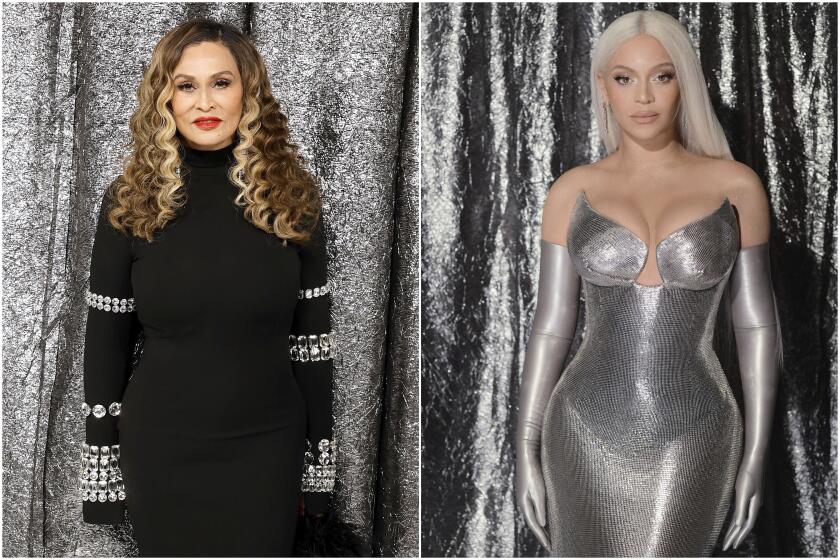Review: Author Emily Nussbaum sees the big picture on the small screen
Not to mince words, the New Yorker’s Emily Nussbaum is one of the best, if not the best, critic writing about TV today. “I Like to Watch,” a collection of her reviews, essays and blog posts, is no mere miscellany. She has fashioned them into a sustained argument for both the uniqueness and importance of television as an art form distinct from movies and novels. As she puts it, “TV as TV.”
So much writing on TV confines itself to throat clearing and recapping. Although this is not a particularly flattering metaphor, Nussbaum is like a ruminant, chewing and digesting her subject, when others are satisfied with gumming and gulping.
To call these essays “reviews” doesn’t do them justice. They are provocations, springboards from which she plunges into deep waters, the big questions that roil the culture, like the relationships between politics, gender, art and audience.
Plopped in the middle is a long, brilliantly executed essay called “Confessions of a Human Shield.” She wrestles with one of the most vexing controversies of the day: “What should we do with the art of terrible men?” The essay is about the dissonance between good art and bad men in the wake of the #MeToo revelations. She looks at the issue from multiple viewpoints, changes her mind, alters the angle and alters it again. Nussbaum relentlessly interrogates her own responses to Woody Allen and his movies; Roman Polanski and his; — along with a fascinating anatomy of her relationship to Louis C.K., the person and the work. She takes her own temperature, checks her pulse, monitors her moods — “audits” herself, as she calls it — as she engages the creations in the context of bad news about the creators.
Nussbaum’s essays are at once brainy and so well written that I found myself stopping not only to ponder the ideas but to savor her prose. She writes like an angel infected with the sportive spirit of a mischievous imp. Discussing “Sex and the City,” she observes that its reputation “has shrunk and faded, like some tragic dry-clean-only dress tossed into a decade-long hot cycle.”
Nussbaum is fond of word play and startling paradoxes. She writes of Kevin Spacey in “House of Cards”: “He’s miscast by being too well cast — there’s no tension in seeing a shark play a shark.” She describes “Rosemary’s Baby” as “a feminist masterpiece created by a sex criminal.” Her prose succeeds in creating an easy intimacy that feels like conversation. Reviewing is personal for her, and she’s present in the writing, like the “I” in the title of the book, now and then introducing snippets of autobiography that ground her opinions. She’s the there there.
Unsurprisingly, she has a soft spot for shows made by and about women. Not only is there a smart defense of “Sex and the City” but one of “Scandal” as well, plus overlooked gems like “Enlightened,” and a too-brief appreciation of “The Good Wife.” Her taste tilts toward the transgressive; she likes “Orange Is the New Black” and “Girls,” for which she uses adjectives like “spiky,” “raw.” But men get their due too, in sharp assessments of “The Sopranos” and “Breaking Bad.”
When she couples “The Sopranos” with “Buffy the Vampire Slayer,” however, the two shows that diverted her from a career in academia, to my mind, she goes astray. She observes that culturally, “one of these shows transcended television. The other one was television.” She means to rescue TV from its chronic “status anxiety,” and suggests that the difference between the two is a “question of values” disguised as a question of aesthetics. She boils it down to: What kind of art do we take seriously, and what not and why? Her examples — the fluffy “Buffy” patronized as cotton candy for teenage females, while “The Sopranos,” praised as meat and potatoes for adult males — suggest that the answer is gender, which is partly true, but there are other reasons as well. Indeed, they’re both TV, but different kinds of TV. “Buffy the Vampire Slayer,” for all it played with network conventions, was basically a broadcast show, while “The Sopranos” was a cable show, taking advantage of all the freedom that cable allowed.
Agreeing or disagreeing with Nussbaum, however, is beside the point. “I Like To Watch” is a must-read for everyone obsessed with the relationship between politics and American culture. She admires “storytelling that alters the audience by demanding that viewers do more than just watch.” If we substitute “read” for “watch,” that’s a pretty good description of a book that asks us to do more than just read, but invites us to think.
“I Like to Watch: Arguing My Way Through the TV Revolution”
Emily Nussbaum
Random House: 384 pages; $28
Peter Biskind is the author of “The Sky Is Falling: How Vampires, Zombies, Androids, and Superheroes Made America Great for Extremism.”
More to Read
Sign up for our Book Club newsletter
Get the latest news, events and more from the Los Angeles Times Book Club, and help us get L.A. reading and talking.
You may occasionally receive promotional content from the Los Angeles Times.








